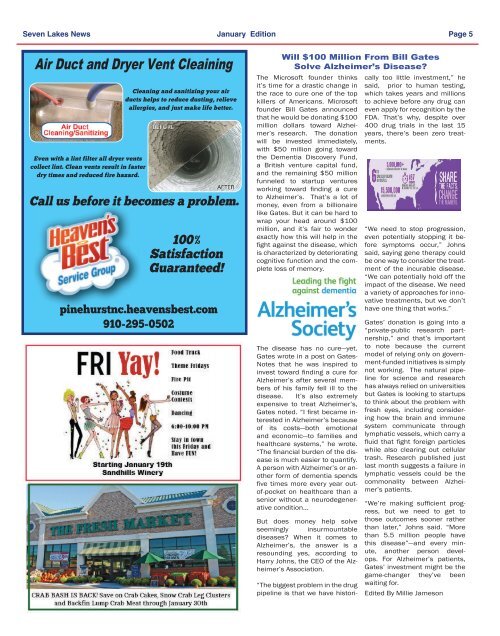You also want an ePaper? Increase the reach of your titles
YUMPU automatically turns print PDFs into web optimized ePapers that Google loves.
Seven Lakes News <strong>January</strong> Edition Page 5<br />
Air Duct and Dryer Vent Cleaining<br />
Even with a lint filter all dryer vents<br />
collect lint. Clean vents result in faster<br />
dry times and reduced fire hazard.<br />
Cleaning and sanitizing your air<br />
ducts helps to reduce dusting, relieve<br />
allergies, and just make life better.<br />
Call us before it becomes a problem.<br />
100%<br />
Satisfaction<br />
Guaranteed!<br />
pinehurstnc.heavensbest.com<br />
910-295-0502<br />
Will $100 Million From Bill Gates<br />
Solve Alzheimer’s Disease?<br />
The Microsoft founder thinks<br />
it’s time for a drastic change in<br />
the race to cure one of the top<br />
killers of Americans. Microsoft<br />
founder Bill Gates announced<br />
that he would be donating $100<br />
million dollars toward Alzheimer’s<br />
research. The donation<br />
will be invested immediately,<br />
with $50 million going toward<br />
the Dementia Discovery Fund,<br />
a British venture capital fund,<br />
and the remaining $50 million<br />
funneled to startup ventures<br />
working toward finding a cure<br />
to Alzheimer’s. That’s a lot of<br />
money, even from a billionaire<br />
like Gates. But it can be hard to<br />
wrap your head around $100<br />
million, and it’s fair to wonder<br />
exactly how this will help in the<br />
fight against the disease, which<br />
is characterized by deteriorating<br />
cognitive function and the complete<br />
loss of memory.<br />
The disease has no cure—yet.<br />
Gates wrote in a post on Gates-<br />
Notes that he was inspired to<br />
invest toward finding a cure for<br />
Alzheimer’s after several members<br />
of his family fell ill to the<br />
disease. It’s also extremely<br />
expensive to treat Alzheimer’s,<br />
Gates noted. “I first became interested<br />
in Alzheimer’s because<br />
of its costs—both emotional<br />
and economic—to families and<br />
healthcare systems,” he wrote.<br />
“The financial burden of the disease<br />
is much easier to quantify.<br />
A person with Alzheimer’s or another<br />
form of dementia spends<br />
five times more every year outof-pocket<br />
on healthcare than a<br />
senior without a neurodegenerative<br />
condition…<br />
But does money help solve<br />
seemingly insurmountable<br />
diseases? When it comes to<br />
Alzheimer’s, the answer is a<br />
resounding yes, according to<br />
Harry Johns, the CEO of the Alzheimer’s<br />
Association.<br />
“The biggest problem in the drug<br />
pipeline is that we have histori-<br />
cally too little investment,” he<br />
said, prior to human testing,<br />
which takes years and millions<br />
to achieve before any drug can<br />
even apply for recognition by the<br />
FDA. That’s why, despite over<br />
400 drug trials in the last 15<br />
years, there’s been zero treatments.<br />
“We need to stop progression,<br />
even potentially stopping it before<br />
symptoms occur,” Johns<br />
said, saying gene therapy could<br />
be one way to consider the treatment<br />
of the incurable disease.<br />
“We can potentially hold off the<br />
impact of the disease. We need<br />
a variety of approaches for innovative<br />
treatments, but we don’t<br />
have one thing that works.”<br />
Gates’ donation is going into a<br />
“private-public research partnership,”<br />
and that’s important<br />
to note because the current<br />
model of relying only on government-funded<br />
initiatives is simply<br />
not working. The natural pipeline<br />
for science and research<br />
has always relied on universities<br />
but Gates is looking to startups<br />
to think about the problem with<br />
fresh eyes, including considering<br />
how the brain and immune<br />
system communicate through<br />
lymphatic vessels, which carry a<br />
fluid that fight foreign particles<br />
while also clearing out cellular<br />
trash. Research published just<br />
last month suggests a failure in<br />
lymphatic vessels could be the<br />
commonality between Alzheimer’s<br />
patients.<br />
“We’re making sufficient progress,<br />
but we need to get to<br />
those outcomes sooner rather<br />
than later,” Johns said. “More<br />
than 5.5 million people have<br />
this disease”—and every minute,<br />
another person develops.<br />
For Alzheimer’s patients,<br />
Gates’ investment might be the<br />
game-changer they’ve been<br />
waiting for.<br />
Edited By Millie Jameson

















